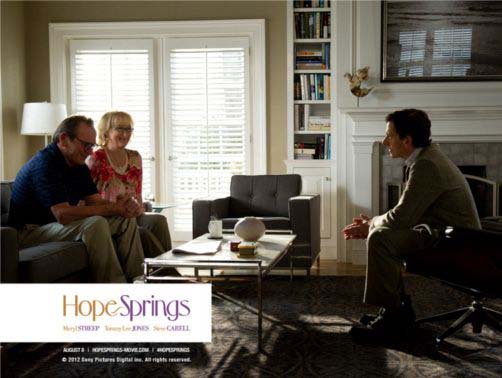Jungian Therapy “Hope Springs” & the Second Half of Life

Jungian therapy affirms that there is life in the second half of life; the film “Hope Springs“, portrays one couple’s exploration of that territory.

This film seems to be marketed like a fairly mindless broad comedy: a big mistake, in my opinion. While extremely funny, this is anything but a shallow film.
The story seems to resonate with many in the second half of life. We empathize deeply with the struggles and sometimes scary awarenesses of Kay and Arnold, the empty nester couple at the center of the film (Meryl Streep; Tommy Lee Jones).
Perils of the Second Half of Life
We learn very early in the film that life for Kay and Arnold contains very few surprises: they are, to say the least, in a very well-worn rut. The second half of life has brought them to a static, rigid place. Joy, connection, deep experience and sexuality have very little place in their world — at the beginning of the film, this is so apparent, it’s painful to watch.

Could Anything Different Now Ever be Possible?
Throughout the film, the couple struggles in one way or another with whether there can be anything more or new in life, or whether they should just exit their therapy, and return to life as it was. This latter possibility, what Jungian therapy calls “regressive restoration of the persona” is always waiting in the wings, and both parties flirt with exiting back to past roles and masks.
The Unlived Life
Yet, simultaneously, something draws them on. It’s what Jungian therapy would refer to as “the unlived life”. Throughout our lives, we make choices, and live certain options out. But our very choice of one option excludes the others that we could have lived out. At some point in life, often, in the second half of life, the unlived life starts to “call to us”. Those possibilities want to be expressed, to be lived out, to round out who we are as persons.
Into The Undiscovered Self
“Hope Springs” is about the journey of a couple, but fundamentally explores the hope that new possibilities might open up in the second half of life. Jung continually emphasized the need to explore this “undiscovered self”, especially in and beyond midlife transition.
Depth case studies, and especially Jungian therapy are concerned with the journey to the new territory of the undiscovered self, and allowing new essential possibilities in the second half of life.
[cta]

tom glennon
Thanks Brian.
It is good to be reminded of these stages
and opportunities. I will keep an eye out for the film.
from Tom
at 60 years old.
Brian C
Thanks very much for your comment, Tom. I certainly think it’s a good film, and I would highly receommend it for anyone, but I think that it has a particular importance for those of us in the late 50s/ early 60s bracket. It’s really a very hopeful, although realistic portrayal. Hope you enjoy the film, and thanks again for your thoughts!